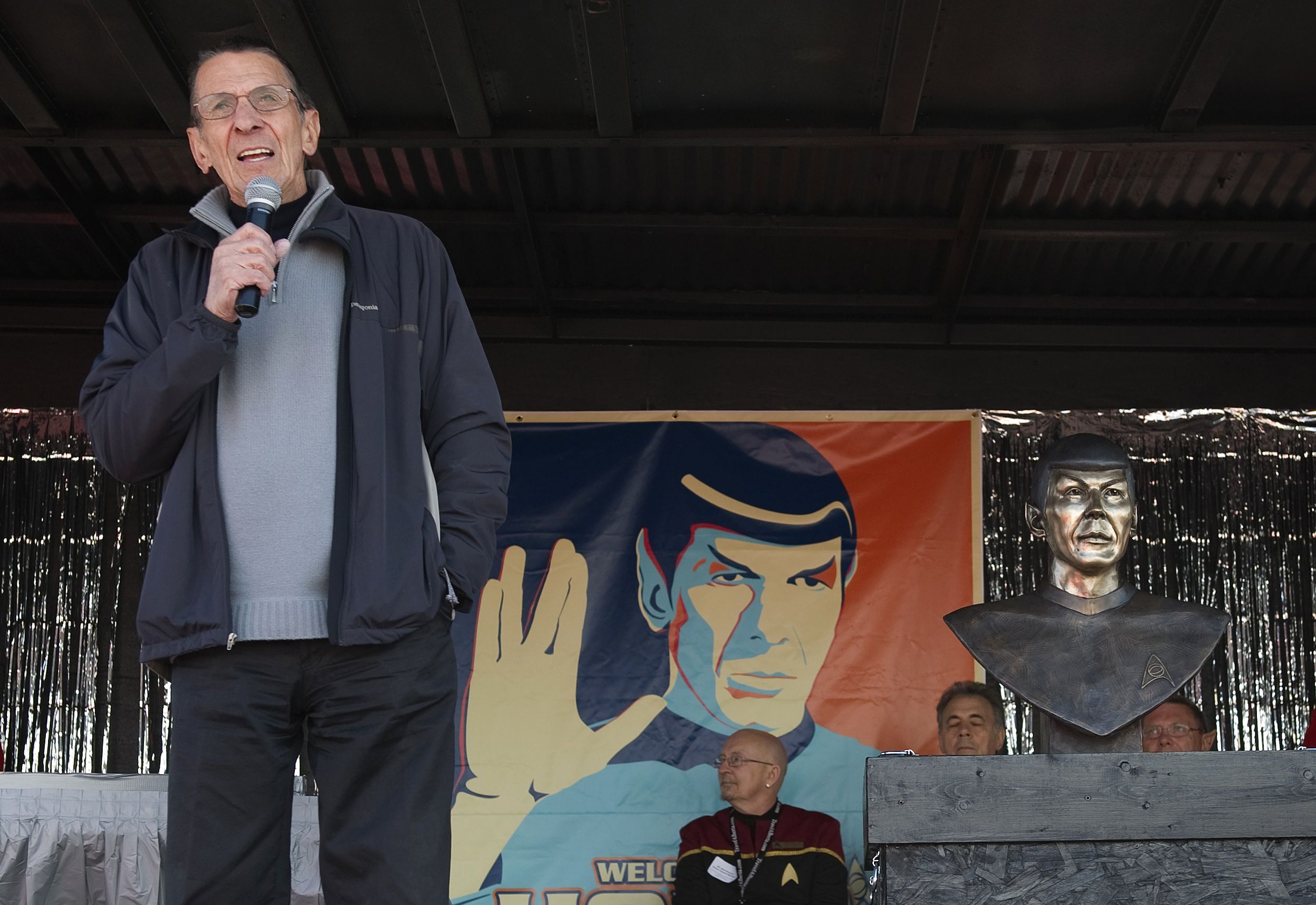
They were the holy trinity, Spock, Bones and Kirk—like the Brothers Karamazov of prime-time sci-fi, embodying mind (Spock/Ivan), heart (Bones/Dmitri) and spirit (Kirk/Alyosha), or at least that was how it was explained to me by a literary Trekkie I knew. That Spock, the pointy-eared half-Vulcan who viewed human irrationality and passion with humor, disdain and occasionally envy proved the most durable is a testament to the performance of Leonard Nimoy, who died today at 83.
Nimoy was more than Mr. Spock, of course, as the first volume of his autobiography (I Am Not Spock) made clear, but he made peace with his character and the show's fanatic followers early on. It helped that the franchise got several reboots in his time—he not only appeared in many of the later Star Trek films but directed two of them—and playing Spock, even appearing at Trekkie conventions as he occasionally did was far more lucrative than writing poetry, something else the Jewish actor did a lot of.
His spoken word records, later re-released as part of Rhino's Golden Throats series, seemed camp even then (though not as laugh-out-loud camp as William Shatner's reading of "Mr. Tambourine Man") but many of these readings sound better now than they did then. Here's Nimoy doing the "Desiderata" ("Go placidly amidst the noise and haste…") from an early recording, and then a video of him reading the same poem years later when his health was failing. "Be cheerful, strive to be happy" being a sort of New Age version of "Live long and prosper." (Nimoy played a sort of est-like shrink in Philip Kaufman's remake of Invasion of the Body Snatchers and went around saying things like, "There's no reason for hate now or love.")

But it wasn't just the hippies who dug Spock—in effect he was more like the Beats, all Alan Watts–Zen cool in the face of Bones's bluster and Kirk's sermonizing. The reason his character has taken his place on whatever TV Mount Rushmore you've constructed in your mind (Columbo, Lucy, Rocky the Flying Squirrel.…) isn't just his acting, though Nimoy was a serious practitioner and teacher of Stanislavski's method (and Shatner, let's face it, was a scenery-chewer of the Charlton Heston school). It's that the tech world, the real future that loomed in the distance after NBC canceled the show in 1968, is by its very nature more Spock-like. Almost every programmer in the world embraces their inner Spock.
"Do you have people asking every single day of your life if you're logical?" Piers Morgan asked Nimoy in one of his last TV interviews. The actor was there to talk about the chronic obstructive pulmonary disease that would soon kill him, and encourage those watching not to smoke, as Nimoy did until about 30 years earlier. "Yeah," he answered with a laugh. They also wanted him to teach them the Vulcan nerve pinch, that renders your enemies immobile.
"I find your arguments strewn with gaping defects in logic," Spock told Bones in one classic riposte, and it's not as though America has become more logical since the show went off the air. But the aspiration to logic, to be less controlled by emotion and blinded by the last thought you had, persists; it's why Sherlock Holmes is constantly being rebooted and scientists Alan Turing and Stephen Hawking became heroes in two Oscar nominated motion pictures this year (The Imitation Game, starring this generation's Sherlock, Benedict Cumberbatch; and The Theory of Everything, for which Eddie Redmayne won best actor for his portrayal of the black hole meister).
You'll find bumper stickers on the expensive cars that fill the parking lots of Silicon Valley referring to Asperger's syndrome, which has been relabeled in the last DSM as an autism spectrum disorder, and aspies, as they sometimes call themselves, are well represented in the tech world. Aspies are marked by a certain aloofness or social awkwardness, and a low tolerance for behavior or statements they find irrational. Mr. Spock is often invoked as an example of a highly functioning autistic (though some aspies, on sites like Wrong Planet, argue with the very premise: He's fictional, for one, and he suppresses his emotions) but as far as heroes go, you could do a lot worse. Though David Byrne runs a close second.
For a more immediate example of Spock's influence—though not of the autistic sort—one need look no further than the White House and our Trekkie-in-Chief Barack Obama. The president has admitted to his inner nerd before, and one need only look at the Town Hall he did on Telemundo the other night to see Spock in action: As his interlocutor and questioners from the audience tried to light him up on the subject of immigration, Obama coolly defended his record and spoke with lawyerly precision about the administration's future plans. He would not be swayed by emotion, or that woman whose grandmother was about to be deported.
Of course, given the choice between Spock and a real blustering Bones type, Senator John McCain, America went with the cool. Even voters who wish for a little more passion on the part of the president seem to feel more comfortable with the cool than the hot. A Kirk candidate I guess would be somewhere in the middle—but the prospect of such a politician succeeding in the current political climate seems galaxies away.
Uncommon Knowledge
Newsweek is committed to challenging conventional wisdom and finding connections in the search for common ground.
Newsweek is committed to challenging conventional wisdom and finding connections in the search for common ground.
About the writer
I'm a freelance writer and editor based in Brooklyn, New York; Salisbury, CT; and Palo Alto, CA. My writing has ... Read more





